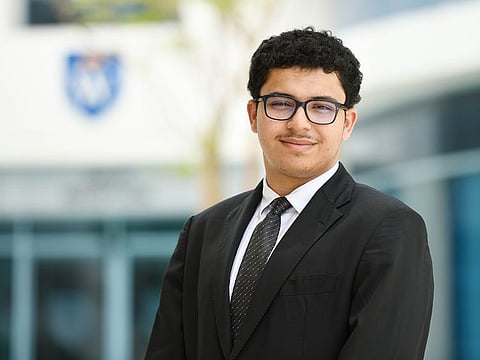Dubai teenager with heart condition fares well in school-leaving exam, shares life lessons learnt
18 year old, who couldn’t attend regular school and suffered fatigue, beats the odds

Dubai: A Yemeni teen in Dubai has managed to overcome his challenging heart condition and perform better than expected on his International Baccalaureate (IB) Diploma.
Unable to attend regular school for nearly two years and suffering from heavy fatigue because of his heart condition (hypertrophic cardiomyopathy), Ebrahim El Ward, 18, still managed to pass the IB Diploma, and is now setting his sights on more ambitious goals. Speaking to Gulf News, he said that his experience had taught him to cope with stress, and to plan ahead.
“I found many regular things hard to manage because of my condition, and had to give up quite a few things I enjoy, like caffeinated beverages and soda. But I didn’t want my own effort, and that of my teachers and family, to go to waste, so I tried my best,” Ebrahim said.
Cardiac illness diagnosis
A student of GEMS Wellington International School, Ebrahim was first diagnosed with hypertrophic cardiomyopathy in 2020, when he was 16 years old. The condition occurs when the heart muscle thickens, making it harder for the organ to pump blood. Typically causing shortness of breath and chest pain, hypertrophic cardiomyopathy can lead to life-threatening irregular heart rhythms and sudden death.
“I would suddenly be short of breath, and people around me would often assume it was because I wasn’t fit. A couple of times I had also felt like I was passing out,” Ebrahim said.
The cardiomyopathy remained undiagnosed, and even though the school nurse asked him to see a cardiac specialist after an episode on campus, Ebrahim didn’t pay much attention to it.
Golfing at 250 beats per minute heart rate
It all came to a head one day when he was out golfing with his friends.
“I wasn’t exerting myself, but suddenly began to feel very sick, and had to call an ambulance. The paramedics did an electrocardiogram, and told me my heart rate was very high at almost 250 beats per minute.”
For comparison, a healthy resting heart rate is usually between 60 and 100 beats per minute.
Ebrahim saw a doctor, and was advised to avoid any strenuous physical activity.
“I used to play football and go to the gym, but I had to stop these activities. My doctor also said I should pay attention to my diet, and ensure proper hydration,” Ebrahim said.
Online schooling
He adjusted to his new regimen, while the COVID-19 pandemic saw schools move online. Even when classes eventually resumed in person, his doctors recommended that he continue online schooling.
“I had had a pacemaker implanted in the summer of Grade 11, so I continued my classes online. Fortunately, a number of my classmates also remained in online schooling, so I didn’t feel like I was missing much,” Ebrahim said.
When Grade 12 classes began, he found that going to school in person was still a struggle. The medications he was taking were helping slow his heart rate, but they also tired him out. So he continued studying from home.
“I was worried about my performance, but I did have the wholehearted support of my family and teachers.”
Future plans
When the results were revealed earlier this month, Ebrahim was thrilled with the outcome as he beat the odds. He is now considering a place at Queen Mary University of London.
“I have always wanted to go to university abroad, and I am planning to study economics and finance, then get into data analysis or investment banking in the future,” he said.
Lifelong learnings
Looking back, the ambitious teen said his brush with cardiomyopathy has taught him a lot.
“I’ve learnt to manage fatigue so that it does not derail my plans. I’ve also learnt to plan properly to avoid burnout, and to give myself enough time for rest.”
Ebrahim would ensure that he got eight hours of sleep every night, and would use music to de-stress during his study breaks.
“These learnings are what I would share with other students facing exams. Exams are always stressful, but planning and regular breaks really help,” he added.
Sign up for the Daily Briefing
Get the latest news and updates straight to your inbox






